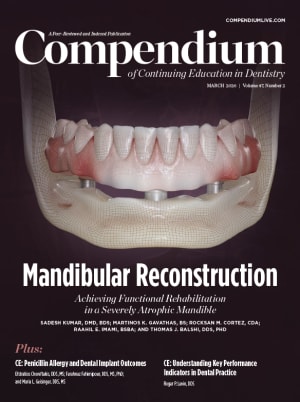Appearances Can Be Deceiving
We've all heard the expression, "things don't always seem as they appear." It means that appearances can be deceiving and that something may look like one thing but be another thing. Although it seems things are falling apart, upon further examination and perhaps with some counsel from a trusted source or two, in reality they are much different than we thought.
Dental clinicians must sometimes provide their patients with a differential diagnosis to determine the real problem. Some oral conditions share similar symptoms, and such an analysis may be necessary to diagnose the patient's condition. The differential diagnosis involves questioning the patient about their symptoms, reviewing their medical and dental histories, and perhaps ordering additional tests and reviewing the results before making a final diagnosis.
A classic example of this is shown in this issue's first continuing education (CE) article involving peri-implantitis. The authors discuss the importance of clinicians providing patients a differential diagnosis of peri-implant lesions versus other comparable lesions. The article outlines clinical, radiographic, and histopathologic features of clinically similar benign and malignant lesions to aid general practitioners in correctly identifying and managing the disease entity. Early recognition and accurate diagnosis can enable timely intervention and facilitate appropriate treatment plans.
Our other CE article focuses not necessarily on the patient, but on the clinician. Although many dental practitioners appear physically fit and in excellent condition, the nature of dental care often forces them to work in awkward positions when treating patients. Thus, precaution is needed to avoid falling prey to common musculoskeletal disorders and shoulder injuries. The author outlines ergonomic strategies for dental professionals to prevent injury and even extend one's career.
As depicted on our cover, this issue of Compendium includes a review of a novel technique for use in guided bone regeneration. The authors describe the use of fixation screws to stabilize the graft-membrane complex as an alternative to using the buccoapical periosteum for membrane stabilization with sutures.
For their patients' sake, dentists can ill afford to be deceived by appearances. Strive to provide optimum care-and eliminate errors-by being diligent and thorough when making diagnoses.
Sincerely,
Markus B. Blatz, DMD, PhD
Editor-in-Chief
markus.blatz@broadcastmed.com
